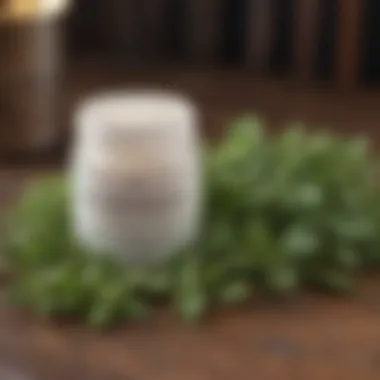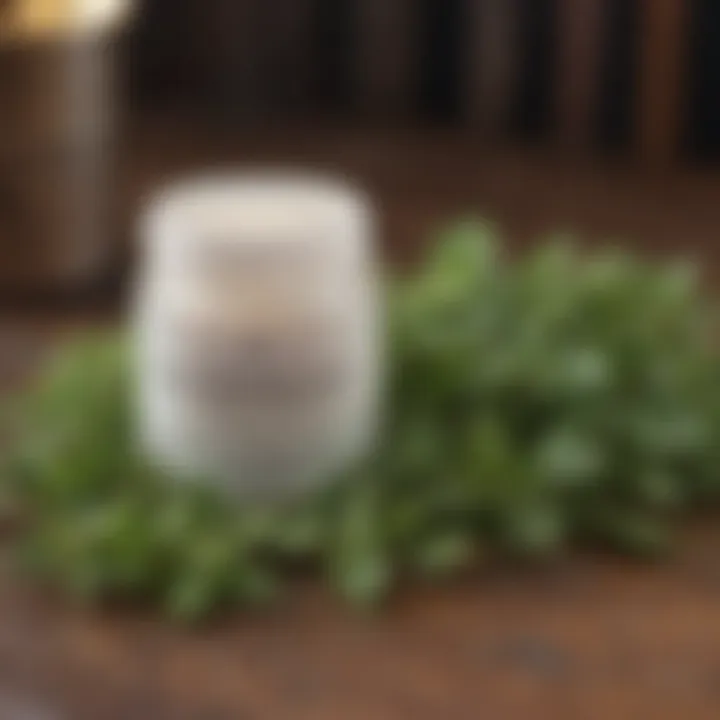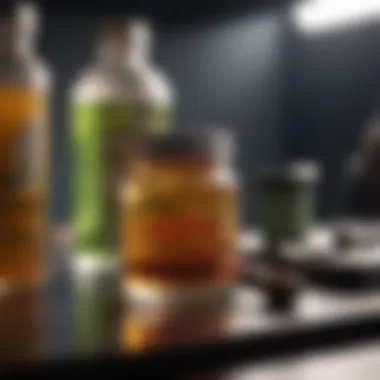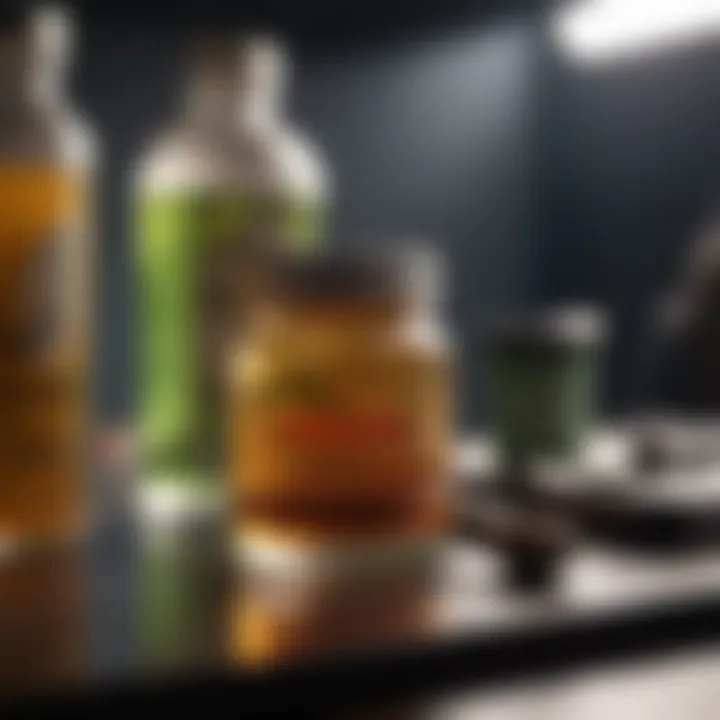Crafting Your Own Effective Cold Sore Remedies


Intro
This article will outline effective methods for making cold sore remedies at home. Understanding the science behind cold sores will help readers select suitable ingredients. In addition, the article provides practical guidance, assessing common treatments and empowering individuals to manage their cold sores effectively.
Foreword to Cold Sores
Cold sores are a common viral infection that affect many people globally. Understanding how cold sores develop and their impact is crucial for those who frequently experience outbreaks. This introduction provides a foundational overview of cold sores, highlighting their prevalence and the need for effective treatments.
Cold sores, typically caused by the herpes simplex virus type 1 (HSV-1), can erupt at inconvenient times. They appear as small blisters on or around the lips and can cause both physical discomfort and emotional distress due to their visible nature. As such, they become not just a health concern but also a social issue. The insights shared in this section are essential for individuals looking to understand the underlying mechanics of cold sores, enabling better management of occurrences and promoting awareness.
Moreover, exploring both conventional and DIY remedies allows individuals to take proactive steps in addressing and alleviating their symptoms. This sets the stage for a detailed analysis of how to formulate personal cold sore relief options with natural ingredients that are readily available.
Understanding Cold Sores
Cold sores often present in the form of clustered blisters, typically found around the mouth. They develop following an initial infection, which can sometimes go unnoticed, as the virus may lie dormant in the body's nerve cells. When triggered by stress, illness, or sunlight, the virus reactivates, leading to the characteristic blisters.
Individuals with cold sores may also experience tingling or itching in the affected area before the blisters appear. These sensations can be signs of an impending outbreak, which many can learn to recognize over time. Understanding these early warning signs can offer individuals a window to initiate treatment and mitigate symptoms effectively.
Causes of Cold Sores
The primary cause of cold sores is the herpes simplex virus type 1, though type 2 can also trigger outbreaks. The virus is highly contagious, spreading through close personal contact, such as kissing or sharing utensils. Initial exposure to the virus often occurs in childhood, either through direct contact or from shared items.
Several factors can trigger outbreaks:
- Stress: Emotional or physical stress can weaken the immune system, allowing the virus to reactivate.
- Illness: Any illness that affects the body, particularly those that cause fever, can also trigger cold sores.
- Sunlight: Overexposure to sunlight can also lead to outbreaks, especially in those with a history of cold sores.
- Hormonal Changes: Fluctuations in hormones, such as those seen in menstruation, can impact outbreak frequency.
Understanding these causes is essential for individuals who wish to manage cold sores effectively, allowing for preventive measures to be taken.
Conventional Treatments for Cold Sores
Conventional treatments for cold sores form a vital part of managing this common viral infection. Cold sores, caused by the herpes simplex virus, can be bothersome and painful. Understanding the various treatment options available is important for those affected. Conventional approaches tend to focus on either managing symptoms or reducing the duration of an outbreak. Each method offers its own benefits and considerations.
Over-the-Counter Medications
Over-the-counter medications are often the first line of defense against cold sores. These options typically include topical creams and ointments containing active ingredients, such as docosanol. These products are made to reduce healing time and alleviate discomfort. Users can apply them directly to the affected area as soon as the first signs of an outbreak appear.
Another common over-the-counter treatment includes topical anesthetics like lidocaine. These preparations help to numb the pain temporarily. They serve to relieve the discomfort associated with the blister before it heals. Although they do not cure the virus, they provide symptomatic relief.
The ease of accessibility is a significant advantage of these medications. Many people can obtain them from pharmacies without a prescription. This convenience often leads to timely treatment. However, users must read labels carefully to ensure they select a product that suits their needs.
Prescription Options
In more severe cases, prescription medications may be necessary. These treatments generally contain antiviral agents, such as acyclovir or valacyclovir. The primary goal of these drugs is to inhibit the replication of the herpes simplex virus. This can significantly shorten the duration of an outbreak and help prevent future occurrences.
These prescription options are particularly beneficial for individuals experiencing frequent or severe outbreaks. They may also be prescribed to those with weakened immune systems, who are at a higher risk for complications. A healthcare provider usually assesses the patient’s condition before recommending an antiviral medication, ensuring that the treatment is appropriate.
Doctors may also suggest a regimen that combines both topical and oral medications for optimal control over the virus. This dual method can enhance efficacy, providing both immediate relief and long-term management of outbreaks.
"Understanding and utilizing conventional treatment options can empower individuals in managing their cold sore outbreaks effectively."
In summary, both over-the-counter and prescription treatments offer viable pathways for managing cold sores. Each option presents distinct advantages and should be considered based on individual circumstances. It is crucial to use these treatments as directed, and consulting with a healthcare provider is always recommended for personalized advice.


The Benefits of DIY Cold Sore Remedies
Creating your own cold sore medicine at home using natural ingredients can offer a multitude of advantages over conventional treatment options. By engaging in DIY remedies, individuals can harness the power of nature, gaining both economic and health-related benefits. Exploring these advantages can significantly enhance one's ability to manage cold sores effectively.
Cost-Effectiveness
One of the primary benefits of DIY cold sore remedies is cost-effectiveness. Store-bought medications can be notably expensive, particularly if a person experiences frequent outbreaks. Many natural ingredients that are effective against cold sores can often be found in local shops, or even in your home. For example, common items like honey, lemon balm, and aloe vera are not only inexpensive but also possess soothing properties that can alleviate discomfort.
By opting for homemade solutions, the user can also make larger quantities, fostering savings for future use. This is especially beneficial for those who face recurrent cold sore outbreaks. Additionally, many DIY remedies can utilize ingredients that have multiple uses, thus reducing waste and promoting sustainability in personal care.
Customization and Control
Another major advantage of DIY remedies is the empowerment of customization and control. When crafting your own cold sore treatment, you can tailor the ingredients based on personal preference and skin sensitivity. Some people may find certain commercial products too irritating, while natural remedies can often be adjusted to ensure they are gentle on the skin.
For instance, if someone has known allergies to certain additives in commercial ointments, they can easily exclude those ingredients in their homemade versions. This control extends beyond ingredients; it also encompasses the formulation process. Users can experiment with varying ratios of ingredients to derive what works best for their unique skin reactions and preferences. Such individualization promotes a more attuned and personalized approach to one�’s skincare regimen, ultimately fostering a greater sense of well-being.
"DIY remedies not only enhance effectiveness but also provide a deeper connection to one’s health journey."
In summary, embracing DIY cold sore remedies can be both economically and personally beneficial. The ability to save money while customizing treatments can enhance the user’s ability to manage cold sore symptoms effectively. Understanding these benefits allows individuals to take proactive steps towards attaining healthier skin with confidence.
Key Ingredients for DIY Remedies
In exploring DIY remedies for cold sores, it is crucial to identify and understand the key ingredients that can provide relief and promote healing. Each ingredient carries unique properties that can contribute to symptom alleviation and skin restoration. By using natural options, individuals might find effective solutions without the side effects often associated with pharmaceutical treatments.
Aloe Vera: Soothing Properties
Aloe vera is often recognized for its skin-soothing capabilities. Its gel-like properties can produce a calming effect on the skin, particularly when irritation arises from cold sores. This plant contains anti-inflammatory compounds that help reduce swelling and redness. Additionally, aloe vera has antibacterial properties which can prevent secondary infections in open sores.
To use aloe vera for cold sores, simply apply fresh aloe vera gel directly onto the affected area several times a day. Not only does it provide immediate cooling relief, but it also aids in moisturizing the skin, promoting a quicker healing process.
Tea Tree Oil: Antimicrobial Benefits
Tea tree oil is known for its strong antimicrobial characteristics. This essential oil possesses antiviral and antifungal properties, making it a useful addition to a DIY cold sore remedy. It can inhibit the growth of specific viruses responsible for cold sore outbreaks, including the herpes simplex virus.
When utilizing tea tree oil, it should always be diluted with a carrier oil, such as coconut oil, before application. This prevents skin irritation. A small amount mixed together can be dabbed onto the sore a few times daily, facilitating a more effective healing environment.
Lemon Balm: Antiviral Effects
Lemon balm has a long history of medicinal use and is noteworthy for its antiviral effects against cold sores. Active compounds in lemon balm, such as rosmarinic acid, have shown the ability to reduce the severity and duration of outbreaks. Furthermore, its calming scent can also help alleviate stress, which is commonly a trigger for cold sore flare-ups.
To harness its effects, one can prepare a lemon balm tea or use lemon balm extract in ointments. Ensuring that it is applied topically can directly target the infected area.
Honey: Natural Healing Agent
Honey has been utilized for its natural healing properties for centuries. It functions as a humectant, drawing moisture to the skin while providing a barrier against external irritants. Its antimicrobial and antioxidant properties also enhance its effectiveness as a soothing agent for cold sores.
Applying a thin layer of raw honey directly on the cold sore can promote faster healing and minimize scabbing. The natural sugars in honey create an environment less favorable for bacteria while allowing the skin to regenerate.
Vitamin E: Skin Repair
Vitamin E is widely acknowledged for its benefits in skin repair. It acts as an antioxidant, protecting the skin from damage and supporting cell regeneration. For cold sores, vitamin E can help soothe the skin, reduce inflammation, and may potentially ease pain associated with breakouts.
Applying vitamin E oil directly to the cold sore can aid in keeping the area hydrated and reduce the appearance of scars once the sore has healed. Regular application during an outbreak can ensure more effective recovery and skin restoration.


"Using natural remedies can provide relief and empower individuals to manage cold sores effectively."
Understanding these key ingredients can equip individuals with the knowledge to create effective DIY remedies. Whether through soothing aloe vera, antimicrobial tea tree oil, antiviral lemon balm, healing honey, or skin-repairing vitamin E, a thoughtful approach to natural treatment exists.
Popular DIY Recipes for Cold Sore Relief
Cold sore outbreaks can be painful and bothersome. Having reliable DIY remedies at hand can empower individuals to manage their symptoms effectively. Utilizing natural ingredients not only offers relief but is also a safe alternative to chemical-laden treatments. These recipes can be custom-tailored to suit personal preferences and sensitivities, making them applicable to anyone. Through these methods, one gains an understanding of effective natural treatments and their preparation, fostering confidence in addressing cold sore issues.
Aloe Vera and Tea Tree Oil Gel
Ingredients Needed
To prepare this gel, basic ingredients include fresh aloe vera gel and pure tea tree oil. Aloe vera is renowned for its soothing properties. It can enhance skin hydration and promote healing, making it indispensable in treating cold sores. Tea tree oil, on the other hand, is known for its antiviral and antimicrobial characteristics. Together, they create a powerful remedy that helps alleviate discomfort and reduces the duration of outbreaks.
The simplicity of these ingredients is what makes them appealing. They do not involve any complex preparations and are easily accessible to most individuals. However, caution is advised with the application of tea tree oil, as it is potent and can cause irritation if used excessively.
Preparation Method
Combining the ingredients is straightforward. Start by extracting fresh gel from the aloe vera leaf. Mix it with a few drops of tea tree oil until thoroughly blended. The method capitalizes on the natural properties of the ingredients without altering their effectiveness. The ease of preparation encourages individuals of all backgrounds to create their own remedies without requiring special skills.
While the benefits are significant, it's essential to store the mixture properly to maintain its efficacy. Keeping it in a cool, dark place will ensure that it remains effective for a longer period.
Lemon Balm Infusion
Ingredients Needed
This infusion primarily requires dried lemon balm leaves and water. Lemon balm is noted for its antiviral properties, particularly against the herpes simplex virus, which causes cold sores. Its calming scent also adds emotional benefits. The natural state of the ingredients preserves their therapeutic qualities, making it a popular choice for those seeking home remedies.
The key feature of lemon balm is its ease of incorporation into daily routines. However, sourcing quality dried lemon balm is crucial, as potency can vary significantly between brands. This variability can affect the overall effectiveness of the remedy.
Preparation Instructions
Preparing a lemon balm infusion involves steeping the dried leaves in boiling water for several minutes. This process extracts the beneficial compounds in the herb, creating a soothing tea. The ritualistic aspect of brewing the infusion adds a calming element, which many users appreciate.
While it may take time for the infusion to cool to a usable temperature, patience here can yield an effective remedy. Users may add honey for flavor, which also boosts healing properties, but should be aware of potential allergies.
Honey and Vitamin E Ointment
Ingredients Needed
For this ointment, one will need raw honey and vitamin E oil. Honey is a well-established natural healer, known for its antibacterial properties and ability to enhance skin hydration. Vitamin E is also recognized for its skin repair capabilities. The combination of these ingredients leads to a remedy that not only soothes but also helps in healing the skin more rapidly.
The distinct advantage lies in honey's texture, as it forms a protective layer on the affected area. However, one must note that allergies to honey are not uncommon, thus caution should be exercised before using this remedy.
How to Prepare
Preparation is quite uncomplicated. Mix equal parts of honey and vitamin E oil to create a smooth ointment. This mixture can be applied directly to the cold sore, and its effectiveness is enhanced through consistent use. The method allows flexibility in the proportions depending on individual needs for consistency and application ease.
While the preparation is straightforward, ensuring that raw honey is used is important. Processed honey may lack some of the beneficial properties that raw honey carries, which could diminish the result one aims to achieve.
> DIY remedies provide a way to harness natural healing agents to alleviate discomfort from cold sores effectively. This approach encourages exploration of ingredients with known benefits while empowering individuals to take charge of their skin health.


When to Seek Professional Help
Understanding when to seek professional help for cold sores is crucial for effective management. While many people can treat their cold sores with DIY remedies, there are instances where professional intervention becomes necessary. Recognizing these moments not only ensures faster healing but also prevents complications. The article emphasizes the importance of discerning severity and seeking professional counsel when indicated.
Identifying Severe Symptoms
Severe symptoms can be an indicator that your cold sore might need professional attention. Common warning signs include:
- Prolonged Outbreaks: If cold sores persist for more than two weeks, it is essential to consult a healthcare provider.
- Severe Pain: Intense pain that does not respond to over-the-counter pain relief may suggest a more serious infection.
- Frequent Recurrences: If you experience multiple outbreaks within a short period, it is wise to discuss this pattern with a doctor.
- Change in Appearance: If the cold sore becomes unusually enlarged or spreads to other parts of the body, professional evaluation is important.
These symptoms should not be ignored, as they can signal that the body is unable to manage the outbreak independently. Furthermore, if you observe signs of secondary infection, such as increased redness, swelling, or pus, medical guidance is crucial.
Consulting a Healthcare Provider
If you notice any of the severe symptoms mentioned, consulting a healthcare provider should be a priority. Physicians can offer a variety of treatments that can speed up recovery and provide relief. Some key considerations include:
- Antiviral Medications: Prescription antiviral drugs can be significantly more effective than DIY remedies for managing the virus's activity.
- Diagnosis and Assessment: A healthcare provider can accurately diagnose the type of virus involved and potential complications that might arise.
- Guidance on Management: Professional advice on how to manage outbreaks in the future can be invaluable. This includes identifying triggers and lifestyle adjustments you can implement.
In summary, knowing when to seek professional help plays a significant role in managing cold sore outbreaks effectively. Do not hesitate to reach out to a healthcare provider when the signs of severity appear.
Preventive Measures for Cold Sores
Preventing cold sores is crucial for individuals who are prone to outbreaks. While it is often impossible to completely avoid the herpes simplex virus, which causes these lesions, understanding and implementing effective preventive measures can significantly reduce the frequency and severity of flare-ups. By addressing key elements such as lifestyle choices and immune system maintenance, one can adopt a proactive approach to managing this condition. This section will explore the primary strategies for avoiding triggers and maintaining a healthy immune system, both vital to preventing cold sores.
Avoiding Triggers
Cold sore triggers can vary widely from person to person. Identifying and avoiding these triggers is essential in preventing outbreaks. Common triggers include stress, fatigue, and sunlight exposure.
- Stress Management: Emotional stress is a common factor that can provoke outbreaks. Practicing relaxation techniques such as meditation, yoga, or deep-breathing exercises can help in managing stress levels.
- Sun Protection: Ultraviolet (UV) rays can lead to cold sores in some individuals. Using sunscreen on the lips and face or wearing wide-brimmed hats can minimize sun exposure.
- Avoiding Certain Foods: Some people find that foods high in arginine, like chocolate and nuts, may trigger outbreaks. Keeping a food diary could help in identifying potential dietary triggers.
- Maintaining Good Hygiene: Regular hand washing and avoiding close contact with others when experiencing symptoms can prevent the spread of the virus and reduce reactivation risk.
By being mindful of these triggers, individuals can better safeguard themselves against cold sore outbreaks, leading to improved quality of life.
Maintaining a Healthy Immune System
A robust immune system plays a pivotal role in preventing cold sore outbreaks. When the immune response is strong, the body can keep the herpes simplex virus in check, reducing the frequency and severity of flare-ups. Here are key considerations:
- Balanced Nutrition: Consuming a diet rich in fruits, vegetables, whole grains, and lean proteins can support immune function. Key nutrients like vitamin C, vitamin E, and zinc are particularly vital for maintaining immune health.
- Regular Exercise: Physical activity is known to boost immunity. Engaging in regular exercise, whether it’s walking, running, or practicing yoga, can enhance overall health.
- Adequate Sleep: Sleep deprivation can weaken the immune system. Ensuring adequate rest is essential for recovery and resilience against infections.
- Hydration: Staying properly hydrated is often overlooked but is crucial for overall health. Water is necessary for every cell's function in the body and can aid in the maintenance of healthy immune responses.
By focusing on these strategies, individuals can strengthen their immune defense, making it less likely for the herpes virus to reactivate and cause cold sores.
End
In this article, we have explored various aspects of DIY cold sore remedies. Understanding the impactful avenues of natural treatments can significantly empower individuals to manage their condition more effectively. The emphasis lies not only on the practicality of these approaches but also on the satisfaction of harnessing natural ingredients to promote healing.
Recap of DIY Approaches
The integration of DIY methods into your routine offers multiple benefits. First, they provide a cost-effective alternative to conventional treatments. Many commercial products can be pricey, whereas common household items can serve as effective alternatives. For example, ingredients such as aloe vera and honey can be easily found and are relatively inexpensive.
Next, customization remains a vital advantage. Individuals can tailor their remedies to suit their specific needs. By adjusting ingredients and formulations, one can create a product that works best for their skin type and sensitivity. This level of control often leads to better outcomes compared to one-size-fits-all products available on the market.
Moreover, several recipes demonstrated in this guide showcase the efficacy of natural remedies. Homemade gels, ointments, and infusions not only give relief but also empower users to take charge of their health.
Emphasizing Natural Treatment
Natural treatments present an alternative approach worth considering in managing cold sores. These remedies often minimize the risk of side effects commonly associated with pharmaceutical options. Many over-the-counter medications come with a list of potential adverse reactions that may dissuade individuals from using them regularly. Conversely, natural ingredients typically have fewer complications.
Furthermore, the use of natural remedies aligns with the growing trend towards holistic health. It encourages individuals to consider overall well-being in their treatment plans. Holistic health focuses not only on symptoms but also on prevention and long-term health.
Overall, the importance of natural treatments cannot be overstated. Emphasizing remedies derived from nature provides a foundation for both effective and responsible health practices. The blend of scientific understanding and practical application can pave the way for greater health autonomy.







